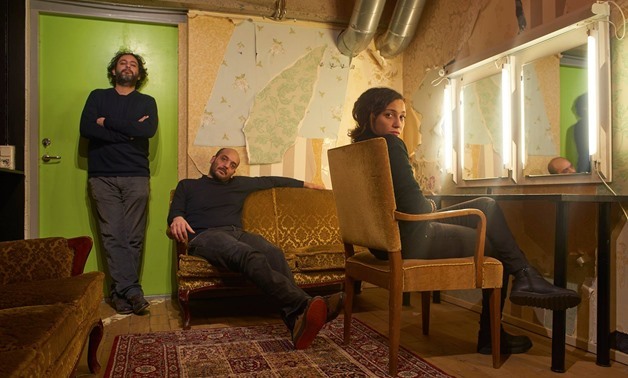
Maryam Saleh, Tamer Abu Ghazaleh, Mauris Louka on cover of recent album “Lekhfa” – Photo courtesy Tamer Abu Ghazaleh’s official page
CAIRO – 20 December 2017: Although Rafah Border, is the sole crossing point between Egypt and Gaza, connection between Egypt and Palestine go far beyond borders to foster in diversified fields including politics, societal, and artistic.
Two vibrant examples resembling the strong connection between both culturally are vibrant in the music scene where they are reviving the common national origins between the two countries.
The first model presents cooperation between two rebellious Egyptian and Palestinian musicians who are inspired by the Egy-Palestinian revolutionary “Turath” music; while the latter highlights an experience of a late prominent novelist who left a literary treasure merging the Egyptian-Palestinian cultures and struggles together, to give unique grasp concerning the Arab resistance.
One of the prominent merged music partnership included the cooperative efforts of Egyptian singer Maryam Saleh and Palestinian music composer Tamer Abu Ghazaleh. Both musicians have incorporated their different music culture and background in to expressing one artistic rebellious production.
“ Maryam Saleh surprised me with her energetic performance in her song “Toul El Taree’” (Throughout the whole way), I was eager to learn how she could deliver a straightforward message mimicking a real struggle through her personified vocal skills ”, Tamer Abu Ghazaleh, Palestinian musician told Egypt Today during an interview on Monday.
Abu Ghazaleh is a Palestinian composer and singer who passionately express his patriotic feelings through his rebellious music vision. He also pointed out that some of the iconic Palestinian musicians who inspired his music career including “Khaled Gubran” a pioneering Palestinian musician who was contributor to authentic Palestinian music. He also taught Abu Ghazaleh how to play Oud.
 Maryam Saleh, Tamer Abu Ghazaleh, Mauris on cover of recent album “Lekhfa” – Photo courtesy Tamer Abu Ghazaleh’s official page
Maryam Saleh, Tamer Abu Ghazaleh, Mauris on cover of recent album “Lekhfa” – Photo courtesy Tamer Abu Ghazaleh’s official page
Abu Ghazaleh also added that Palestinian singer Kamilya Jubran is a common inspirational icon to both Abu Ghazaleh and Saleh. Kamilya has also founded Palestinian band “Sabrin”, that was known in the 1980’s for producing modified recreations of folkloric music. They had a focused passion targeting to experimenting new colors and techniques in the music field.
Saleh started as a modernized version of El Sheikh Emam who is an Arab rebellious icon known for his satirical songs focused on tackling societal issues related to working classes. Her rebellious identity, vision and acting skills are found in her songs which Abu Ghazaleh. Consequently, they teamed up, pursuing an artistic partnership exploring joy, struggles and spiritual human emotions .
Abu Ghazaleh believes that a musician unconsciously is able to attain his/ her specific general knowledge and music inspiration that is reflected through their own. This belief was applied in Abu Ghazaleh and Saleh’s music cooperation.
Album “Msh Baghany” (I Am Not singing), which was released in 2012 under the supervision of Abu Ghazaleh , was the first cooperation between him and Saleh while “Lekhfa” album was the latest cooperation between them.
They both have their own different cultural references and music knowledge which helped them invent special recreated music.
Abu Ghazaleh also added that their latest controversial album “LekhFa” aimed to explore the culture of “Shaabi” (Popular music) that enabled him, Saleh and Egyptian alternative musician Maurice Lauca to introduce an active picture for the current state of crowded Egyptian streets through different contradicting lyrics tackling complex inner human conflicts.
Abu Ghazaleh said that real art is meant to reflect the reality of society. The Palestinian- Israeli conflict is not only portrayed in music, but also in many Arabic literary works including the prominent modern Arabic literature icon late Egyptian author Radwa Ashour whose death memory has been commemorated earlier this month.
Despite being purely Egyptian, the renowned author is also Palestinian in heart in which she passionately conveyed a blend of reality and historical fiction in her novels that were based on the idea of resistance against oppression; a common case between both Palestinians and Egyptians.
.jpg) Renowned late Egyptian author Radwa Ashour with her son Tamim Al-Barghouti - Photo courtesy of Radwa Ashour's official Facebook page
Renowned late Egyptian author Radwa Ashour with her son Tamim Al-Barghouti - Photo courtesy of Radwa Ashour's official Facebook page
Among many of Ashour’s novels, ”Farag” and “Woman Of Tantoura” which focused equally on conflicts in both countries.
In “Woman Of Tantoura”, Ashour denounces Israeli violence strong-heartedly defends the Palestinian case as if she was of Palestinian origins. Her defensive attitude is reflected through the struggle of a Palestinian woman born in the Palestinian village called “Tantoura” highlighting the mass killings in the refugees camps located in Lebanon called “Sabra” and “Shatila”.
The same concept was also reflected in Ashour’s novel “Farag” in which she produced a touching and dramatic sequence of events that take place during the regimes of former Egyptian presidents Gamal Abdel Nasser Anwar El Sadat.
Ashour was married to Palestinian poet Mouried Barghouti who had their famous son Egyptian/ Palestinian poet Tamim al-Barghouti. Her Palestinian-oriented family has influenced her literary works.
Throughout history, the art scene has been able to portray the strong culture and artistic ties between Palestine and Egypt and continues to produce authentic works inspired by both cultures manifested within remarkable productions.


.jpg)
Comments
Leave a Comment